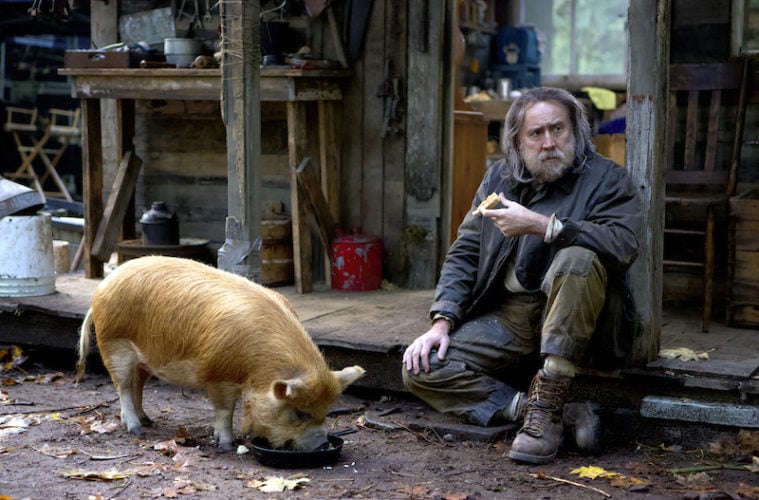 By now you can treasure Nicolas Cage without necessarily loving him or the movies he chooses to make, but there’s no denying his Bourdain-ish appetite for new and different things. In 40 years of movie-making, you name it, he’s tackled it: Coen farce, Lynch trip-out, family tearjerker, glowering blockbuster, low-budge neo-noir, uncategorizable whatzits, and lately, every kind of eccentric genre indie imaginable, at the rate of four or five a year.
By now you can treasure Nicolas Cage without necessarily loving him or the movies he chooses to make, but there’s no denying his Bourdain-ish appetite for new and different things. In 40 years of movie-making, you name it, he’s tackled it: Coen farce, Lynch trip-out, family tearjerker, glowering blockbuster, low-budge neo-noir, uncategorizable whatzits, and lately, every kind of eccentric genre indie imaginable, at the rate of four or five a year.
Through it all, the essential Cage-ness remains. It’s an utterly unique cocktail of masochistic emotional commitment and explosive self-campiness, whether he affects a stone-like action-movie stoicism or careens into bouts of the stylized behavioral hyperbole (Peggy Sue Got Married, Vampire’s Kiss, Mandy) that is his alone. His hangdog visage has become a classic American alt-brand, a sometimes risible but strangely axiomatic factor of our communal dream-life.
But now we’ve seen everything. The plotline of Pig gives you an idea: a reclusive truffle hunter has his pet pig kidnapped, and he ventures back into the urban abyss (Portland!) he loathes to find her, and to exact revenge? Debut director Michael Sarnoski works in the key of angst and doom from the very beginning, planting us in the Oregon wilds with Cage as Rob, an off-the-grid wild man living in a plumbing-free shack and digging truffles for what little cash he needs, with only his medium-sized truffle hog as a companion.
When Amir the young city slicker (Alex Wolff, in a surprisingly thoughtful performance) shows up in a sports car to buy the fungi for resale to swanky restaurants, it’s clear that Rob has abandoned any effort at dealing with human beings, hinting at a dark past (complete with dead lover) you know you’ll get a dose of soon enough. Soon thereafter, the cabin is busted into, Rob is knocked out, and Rob’s porcine buddy is gone. Like a bitter, Neeson-esque ex-cop returning to gangland to retrieve his kidnapped daughter, the single-minded Rob trudges back to civilization, and with Amir’s help, hits the old hot spots of his previous life — as a star chef– in order to find the bastards who took his pig.
Pig is not a thriller anymore than it is a comedy, and has almost no violence or suspense. In fact, the bedeviling and rather lovely thing about Sarnoski’s film is that it seems to think it is a thriller, with its brooding self-significance, criminal-underworld ambience, ominous score, and nothing-left-to-lose hero. “You don’t exist!” he’s told by Portlanders not happy to see him back in town. The film is actually a character study, a perfectly Cage-ian idyll about a self-imposed exile revolted by modern capitalist society. He’s not feared by anyone; in fact, mostly he’s shunned as homeless.
The Janus-like split down the movie’s middle – between genre affect and mundane substance – gives it a puzzling integrity; you can’t say the movie isn’t committed to this man and this pig. What’s more, the subculture Rob re-enters borders on the surreal. In this “huckleberry foam” food-service demimonde, eateries hire homeless men to beat unconscious in basement rituals, truffles are hustled like stolen gems, and haute cuisine is run by mobster-like restauranteurs (here, Mr. Big is Amir’s disapproving Dad, played by Adam Arkin). In one exhilarating scene, Cage’s filthy outsider faces off against an ex-employee (a great David Knell)–who’s smugly crafting hip meta-food in a posh café– confronting him with his old, abandoned chef dreams only to see his glib self-satisfaction melt into shattered ego right at the table.
Due to its title, its subject, and its disjunctive use of genre stuff, Pig is daringly mockable, but everyone, especially Cage, acts as though it’s serious as cancer, and you have to respect their resolve. Would it have made sense with any other actor? New Wave-era French critic Luc Moullet once remarked that old-school B-director Edgar G. Ulmer’s wild catalogue of films were all about “the great solitude of man without God.” If that sounds like an absurd auteurist overreach for Ulmer, consider how it characterizes Cage’s externalized-internal persona in his last several dozen films. Given the man’s epic sincerity and iconic weirdness, in movies good and dismal and in between, it’s not too far-out.
Advertising disclosure: We may receive compensation for some of the links in our stories. Thank you for supporting LA Weekly and our advertisers.

